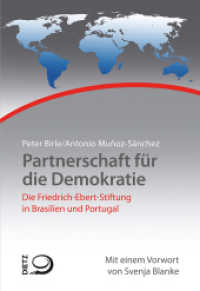- ホーム
- > 洋書
- > 英文書
- > Business / Economics
基本説明
New in paperback. Hardcover was published in 1996. Interweaves and compares the history, economics, and class structures of the three countries, El Salvador, Costa Rica, and Nicaragua.
Full Description
In the revolutionary decade between 1979 and 1992, it would have been difficult to find three political systems as different as death-squad-dominated El Salvador, peaceful social-democratic Costa Rica, and revolutionary Sandinista Nicaragua. Yet when the fighting was finally ended by a peace plan initiated by Costa Rica's President Oscar Arias, all three had found a common destination in democracy and free markets. To explain this extraordinary turn of events is the task of this landmark book, which fuses political economy and cultural analysis.
Both the divergent political histories and their convergent outcome were shaped by a single commodity that has dominated these export economies from the nineteenth century to the present--coffee. Jeffery Paige shows that the crises of the 1980s had their roots in the economic and political crises of the 1930s, when the revolutionary left challenged the ruling coffee elites of all three countries. He interweaves and compares the history, economics, and class structures of the three countries, thus clarifying the course of recent struggles. The heart of the book is his conversations with sixty-two leaders of fifty-eight elite dynasties, who for the first time tell their own stories of the experience of Central American revolution.
Paige's analysis challenges not only Barrington Moore's influential theory of dictatorship and democracy but also contemporary approaches to "transitions to democracy." It also shows that a focus on either political economy or culture alone cannot account for the transformation of elite ideology, and that revolution in Central America is deeply rooted in the personal, familial, and class histories of the coffee elites.
Contents
Preface Introduction PART 1: SOCIAL ORIGINS OF THE CENTRAL AMERICAN CRISIS 1. Revolution and the Coffee Elite 2. Class and Class Relations PART 2: HISTORY AND MEMORY: THE CRISIS OF THE 1930S 3. Farabundo Marti and the Failure of Revolutionary Socialism 4. Manuel Mora and the Rise of Euro-Communism 5. Augusto Cesar Sandino and the Failure of Revolutionary Nationalism PART 3: NARRITIVES OF CLASS: THE CRISIS OF THE 1980S 6. Agro-Industrialists versus Agrarians in El Salvador 7. Democracy and Anti-Communism in Costa Rica 8. Neo-Liberalism and Agro-Industry in Costa Rica 9. Liberty and the Contra in Nicaragua PART 4: SOCIAL TRANSFORMATION AND ELITE NARRITIVES, 1979-1992 10. Democracy and Revolution 11. From Liberalism to Neo-Liberalism Appendix A: Marriages and Descendents of Children of James Hill and Dolores Bernal Najera Appendix B: Selection of the Interview Population Notes Index






